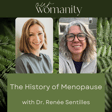
9. Midlife Physical Wellness with Michelle Stiff
How do fitness and nutrition affect our midlife?
This week, I am joined by a close friend, Michelle Stiff, a Women’s Health, Fitness & Metabolism Coach, teaching women how to reset their metabolism, shed stubborn inches, and regain confidence using a sustainable and flexible macro approach.
Michelle shares her journey of struggling with the yo-yo diet cycle that affected her fertility. After suffering multiple miscarriages, she had to find a better way even when doctors couldn’t help her. Using a mind-body holistic approach, she was able to improve her health & now has two healthy boys. She then went on to found her company, Wellness Elevate and create her signature program, the Metabolic Momentum Method - so that other women don’t have to suffer.
The Wellness Elevate team includes Transformational Nutrition Coaches and a Functional Diagnostic Practitioner who utilizes functional blood tests to identify each client's unique needs. Whether you're battling fat loss, managing hormones, or simply seeking better health & fitness, the WE team will tailor a customized plan that truly works for YOU.
Featured in this episode:
- Perimenopause and hormone fluctuations
- Resistance training and building muscle for metabolism
- 80/20 principle with food
- Batching meals and getting creative
- Exercise for purpose instead of just weight loss
Submit your questions on anything and everything women's health-related and we will answer them in one of our episodes.
Want more from Our Womanity?
If you enjoyed this episode of Womanity, please subscribe, rate, and leave a review. Your feedback helps us continue to bring you engaging and empowering content.
Follow us on social media:
- Instagram: @drrpope
- TikTok: @vulvadoctor
- Twitter: @drrpope



















